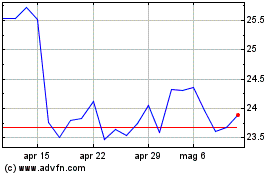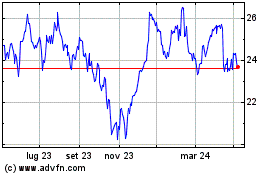U.S. Tariffs Power World's Biggest Steelmaker
07 Febbraio 2019 - 3:43PM
Dow Jones News
By Alistair MacDonald
ArcelorMittal SA, the world's largest steelmaker, posted its
highest annual profit in almost decade on Thursday, helped by the
U.S. steel tariffs that boosted revenue in the company's large
North American business.
ArcelorMittal predicted growth in global steel consumption would
fall this year and many analysts believe that the industry faces
challenges as the global economy slows. Demand in China, in
particular, is expected to contract, which could also mean the
country's own steel products will end up competing abroad.
Lakshmi Mittal, the company's chairman and CEO, said he remains
confident that measures put in place by the U.S. and Europe will
continue to protect those markets from excess imports.
Mr. Mittal said President Trump's 25% tariff on steel imports,
enacted last March, improved pricing in the U.S., where the
Luxembourg-based company is the second-largest steel producer.
He added there is little reason for the U.S. or Europe to remove
protections on their steel industries, given other markets have
unfair advantages, such as state subsidies.
"This (global steel) overcapacity will always be a
challenge...this has to be addressed all the time," Mr. Mittal
said.
U.S. steel prices rose by as much as 41% from the start of 2018
when buyers began to anticipate tariffs, according to S&P
Global Platts. ArcelorMittal said the average selling price of
steel in North America was $852 a ton, up 15% from the year
before.
"ArcelorMittal is a leading (U.S.) steelmaker and therefore has
clear direct benefit from the higher U.S. steel price, aided by
trade protections," said Seth Rosenfeld, a senior research analyst
covering European and U.S. steel at the investment bank Jefferies
in London.
ArcelorMittal reported full-year earnings of $10.3 billion
before interest, taxes, depreciation and amortization, an increase
of 22% from the year before. Annual net income was $5.1 billion, up
12.7% on 2017.
Operating income in the company's North American business, which
includes the U.S., Canada and Mexico, was up almost 60% in 2018.
Around two thirds of steel production in the region is in the U.S.,
the company said.
The company's Mexican and Canadian businesses, though, have had
to pay the 25% tariff on some products being exported into the
U.S., offsetting at least some of the benefits in the U.S.
The increases in steel prices have made the tariffs unpopular
with manufacturers and foreign steel producers.
Mr. Mittal, though, said steel was a small component of his
customers' costs.
The company was also boosted by increased demand in Brazil, one
of its core markets.
For 2019, the company predicted global apparent steel
consumption, which doesn't take into account changes in stocks,
would be 0.5 to 1%, versus 2.8% last year.
Although the company's quarterly results aligned closely with
analysts' consensus, ArcelorMittal's share price was down 3.35% at
midday in London.
"Following very robust recent days of equity performance, we are
not wildly surprised by the modest pullback in (the company's)
shares on the back of relatively uneventful results today," said
Mr. Rosenfeld.
Some analysts complained that the company had not managed to
reduce its net debt, which was $10.2 billion.
Write to Alistair MacDonald at alistair.macdonald@wsj.com
(END) Dow Jones Newswires
February 07, 2019 09:28 ET (14:28 GMT)
Copyright (c) 2019 Dow Jones & Company, Inc.
Grafico Azioni ArcelorMittal (EU:MT)
Storico
Da Mar 2024 a Apr 2024

Grafico Azioni ArcelorMittal (EU:MT)
Storico
Da Apr 2023 a Apr 2024
